

A Mathematician’s Survival Guide. This is a reprint, with permission from the author, of Professor Peter Casazza’s brilliant article, “A Mathematician’s Survival Guide”.
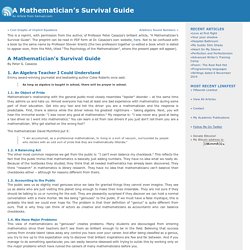
The preprint can be read in PDF form at Dr. Casazza’s own website, here. Not to be confused with a book by the same name by Professor Steven Krantz (the two professors together co-edited a book which is slated to appear soon, from the MAA, titled “The Psychology of the Mathematician”, where the present paper will appear). By Peter G. Casazza 1. Emmy award-winning journalist and bestselling author Cokie Roberts once said: As long as algebra is taught in school, there will be prayer in school. 1.1. Mathematician’s relationship with the general public most closely resembles “bipolar” disorder – at the same time they admire us and hate us. The mathematician David Mumford put it: We Are Typists First, Programmers Second. Remember last week when I said coding was just writing?
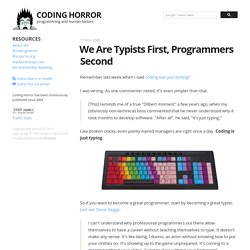
I was wrong. As one commenter noted, it's even simpler than that. [This] reminds me of a true "Dilbert moment" a few years ago, when my (obviously non-technical) boss commented that he never understood why it took months to develop software. "After all", he said, "it's just typing.
" Like broken clocks, even pointy-haired managers are right once a day. So if you want to become a great programmer, start by becoming a great typist. I can't understand why professional programmers out there allow themselves to have a career without teaching themselves to type. I had a brief email exchange with Steve back in March 2007, after I wrote Put Down The Mouse, where he laid that very same Reservoir Dogs quote on me. I was trying to figure out which is the most important computer science course a CS student could ever take, and eventually realized it's Typing 101.The really great engineers I know, the ones who build great things, they can type.
Hidden Costs Video Series - InsuranceQuotes.org. The Nastiness Problem in Computer Science. By Bertrand Meyer August 22, 2011 Comments (32) Are we malevolent grumps?
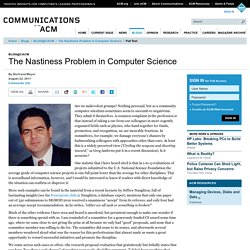
Nothing personal, but as a community computer scientists sometimes seem to succumb to negativism. They admit it themselves. A common complaint in the profession is that instead of taking a cue from our colleagues in more cogently organized fields such as physics, who band together for funds, promotion, and recognition, we are incurably fractious. In committees, for example, we damage everyone's chances by badmouthing colleagues with approaches other than ours.
One statistic that I have heard cited is that in 1-to-5 evaluations of projects submitted to the U.S. More such examples can be found in the material from a recent keynote by Jeffrey Naughton, full of fascinating insights (see his Powerpoint slides). Much of the other evidence I have seen and heard is anecdotal, but persistent enough to make one wonder if there is something special with us. What is your experience? Lorin Hochstein August 22, 2011 09:26. Six things a text editor must do - or it's a one-way trip to the trash. Stob When I heard, in a tutorial video, the multi-platform programmer's editor Sublime described as "the cool kids' code editor" (or possibly "the Cool Kid's code editor" - the speaker didn't enunciate his capitals and apostrophes very clearly) I was puzzled.

As the goto (or, rather, the call-by-reference) consultant on Agile Harlem Shake in the northwest corner of our floor, surely no such assertion could plausibly be made without first interviewing me? Nothing would have come of this if TextPad, normally as reliable as a tax demand, had not crashed. Twice. Unprovoked. Editing piddly little config files.
I mean, in about 1998 I actually registered it with my own money. This counts for nothing when there's a brace of bifurcated .ini files squirming about on my hard disk like sadistically razor-bladed earthworms. The Plan. Stevey's Blog Rants: Programming's Dirtiest Little Secret. This is another one I've wanted to write forever.
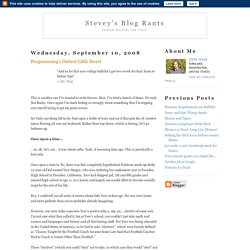
Man, I've tried a bunch of times. No ruck. Not Rucky. Once again I'm stuck feeling so strongly about something that I'm tripping over myself trying to get my point across. So! Once upon a time... Well, Actually. Why you are not getting laid As software developers, we develop habits that allow us to build products that work and do not fail under stress.
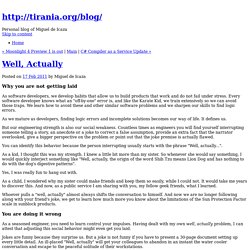
Every software developer knows what an "off-by-one" error is, and like the Karate Kid, we train extensively so we can avoid those traps. We learn how to avoid these and other similar software problems and we sharpen our skills to find logic errors. As we mature as developers, finding logic errors and incomplete solutions becomes our way of life. It defines us. But our engineering strength is also our social weakness. You can identify this behavior because the person interrupting usually starts with the phrase "Well, actually... ". Windows 95 Tips, Tricks, and Tweaks.